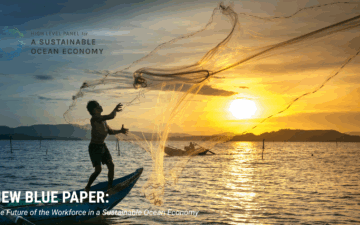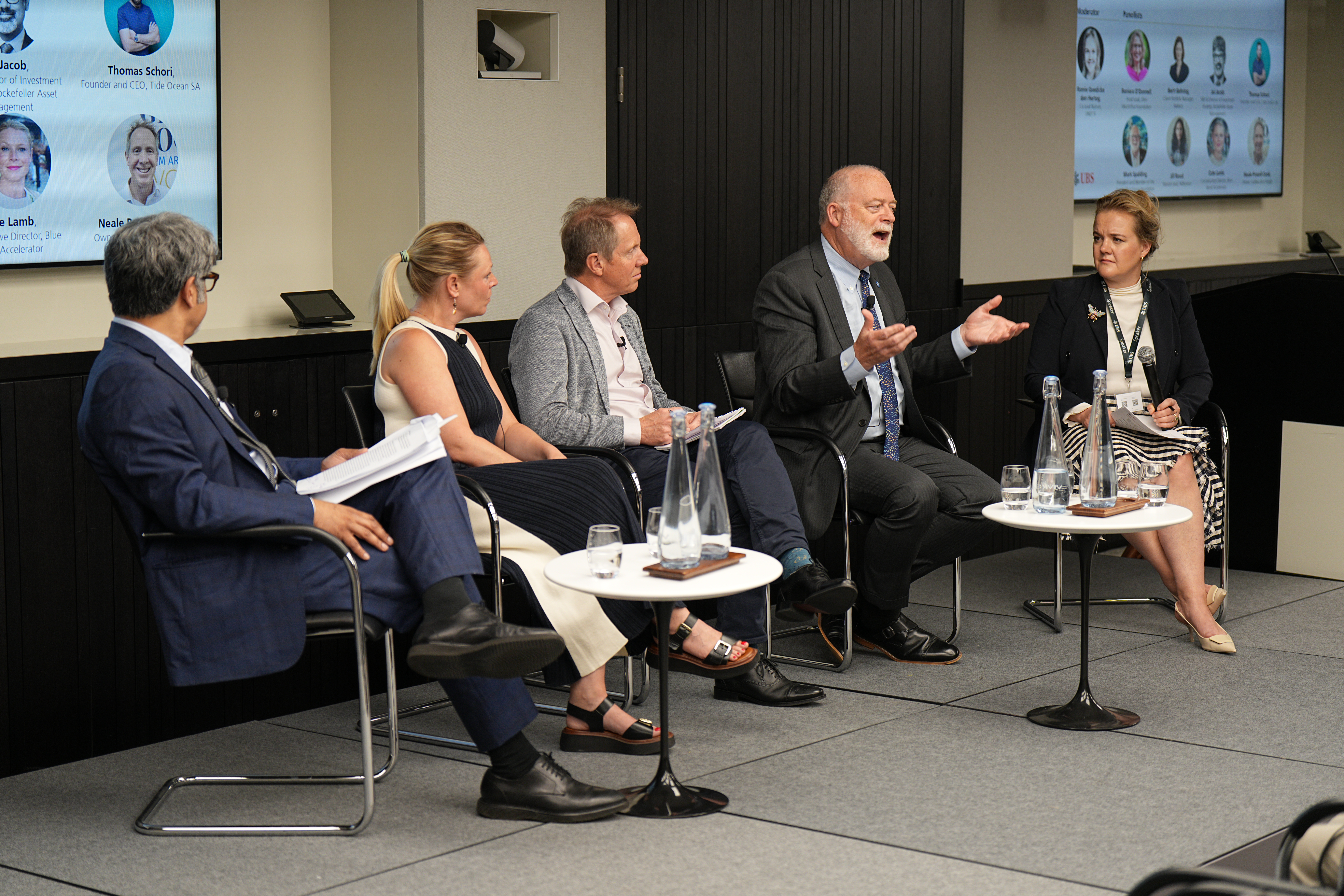Gathering to talk about ocean issues, climate change, and other challenges to our collective well-being is important—face to face workshops and conferences bolster collaboration and foster innovation—especially when the purpose is clear and the goal is to produce a blue print or implementation plan for change. At the same time, given transportation’s contribution to greenhouse gas emissions, it’s as important to weigh the advantages of attendance against the impact of getting there—especially when the topic is climate change where the effects are exacerbated by our collective increase in greenhouse gas emissions.
I start with the easy options. I skip attending in person where I don’t think I can add value or receive value. I buy blue carbon offsets for all of my trips—air, car, bus, and train. I choose to fly on the Dreamliner when I am heading to Europe—knowing it uses a third less fuel to cross the Atlantic than older models. I combine several meetings into a single trip where I can. Still, as I sat on the plane home from London (having started in Paris that morning), I know that I must find even more ways to limit my footprint.
Many of my American colleagues flew to San Francisco for Governor Jerry Brown’s Global Climate Action Summit, which included many climate commitments, some of which highlighted oceans. I chose to go to Paris last week for the “High-Level Scientific Conference: From COP21 towards the United Nations Decade of Ocean Science for Sustainable Development (2021-2030),” which we called the Ocean Climate Conference to save breath and ink. The conference focused on the #OceanDecade.
The Ocean Climate Conference “aims at synthesizing recent scientific progress on ocean and climate interplays; evaluating the latest ocean, climate and biodiversity trends within the context of increased concerted ocean actions; and reflecting on ways to move ‘from science to action’.”
The Ocean Foundation is a member of the Ocean & Climate Platform, which co-hosted the conference with the UNESCO Intergovernmental Oceanographic Commission. In all of the years of reports from the Intergovernmental Panel on Climate Change (IPCC), we have not had serious consideration given to the effects of climate change on our global ocean. Instead, we have been focused on how climate change was going to affect human communities.
Much of this meeting in Paris continues our work as a member of the Ocean & Climate Platform. That work is to integrate the ocean into international climate negotiations. It feels somewhat monotonous to revisit and update topics that seem obvious, and yet is critical because there remain knowledge gaps to overcome.
So, from the ocean’s perspective, excess greenhouse gas emissions have already had and continue to have an ever-expanding negative impact on marine life and the habitats that support it. A deeper, hotter, more acidic ocean means a lot of changes! It’s a little like moving to the Equator from the Arctic without a change of wardrobe and expecting the same food supply.
The bottom line from the presentations in Paris is that nothing has changed about the problems we face. In fact, harm from our disruption of the climate is more and more apparent. There is the sudden calamitous event where we are awestruck by the sheer magnitude of the harm from a single storm (Harvey, Maria, Irma in 2017, and now Florence, Lane, and Manghut among those so far in 2018). And there is the continuous erosion of ocean health by sea level rise, higher temperatures, greater acidity, and increasing freshwater pulses from extreme rain events.
Likewise, it is clear how many nations have been working on these issues for a long time. They have well documented assessments and plans to address the challenges. Most of them, sadly, sitting on shelves gathering dust.
What has changed in the last half decade is regular setting of deadlines for the fulfillment of national commitments to specific, measurable actions:
- Our Ocean (thank you Secretary Kerry) commitments: Our Ocean is an international gathering of government and other ocean-focused organization that began in 2014 in Washington DC. Our Ocean serves as a public platform from which nations and others can announce their financial and policy commitments on behalf of the ocean. As important, those commitments are revisited at the next conference to see if they have heft.
- UN Sustainable Development Goals (designed bottom up, not top down) for which we were happy to be part of the first ever UN conference focused on the ocean (SDG 14) in 2017, which calls for nations to work towards improving the human relationship with the ocean, and which continues to provide incentives for national commitments.
- Paris Agreement (Intended Nationally Determined Contributions (INDCs) and other commitments—About 70% of INDCs include ocean (112 in total). This gave us leverage to add an “Ocean Pathway” to COP 23, held in Bonn in November 2017. The Ocean Pathway is the name given to increasing the role of the ocean considerations and actions in the UNFCCC process, a new element of the annual COP gatherings. COP is the shorthand for Conference of the Parties to the United Nations Framework Convention on Climate Change (UNFCCC).
Meanwhile, the ocean community still needs to ensure that the ocean is fully integrated into the climate negotiation platform. The platform integration effort has three parts.
1. Recognition: We first needed to ensure the ocean’s role as a carbon sink and heat sink was recognized, as well as its role in trans-evaporation and thus key contribution to weather and climate over all.
2. Consequences: This in turn allowed us to focus climate negotiators’ attention on the ocean and the consequences (from part 1 above: Meaning that carbon in the ocean causes ocean acidification, the heat in the ocean causes water to expand and sea levels to rise, and the sea surface temperature and interaction with air temperatures result in more severe storms, as well as fundamental disruption of “normal” weather patterns. This, of course, was easily translated into a discussion of the consequences for human settlements, agricultural production and food security, and the expansion in the number and locations of climate refugees as well as other displacements.
Both of these parts, 1 and 2, today seem obvious and should be considered received knowledge. However, we continue to learn more and there is a critical value in updating our knowledge of the science and consequences, which we spent part of our time doing here in this meeting.
3. Effects on ocean: Recently our efforts have moved us towards convincing the climate negotiators of the necessity to consider the consequences of our disruption of the climate for the ecosystems and flora and fauna of the ocean itself. The negotiators commissioned a new IPCC report which should be issued this year. Thus, part of our discussions in Paris were regarding the synthesis of the tremendous volume of science on this (part 3) aspect of the integration of the global ocean into the climate negotiations.

Because it is all about us, there will no doubt soon be a fourth part of our conversation that addresses the human consequences of our harm done to the ocean. When ecosystems and species shift due to temperature, coral reefs bleach and die, or species and food webs collapse due to ocean acidification how will this affect human lives and livelihoods?
Sadly, it feels that we are still focusing on convincing the negotiators and explaining the complexities of the science, of the climate and ocean interactions and related consequences, and are not moving fast enough to discuss solutions. On the other hand, the central solution to addressing our disruption of the climate is to reduce and eventually eliminate the burning of fossil fuels. This is well accepted, and there are no real arguments against doing so. There is just inertia to prevent change. There is much work being done on moving beyond carbon emissions, including the commitments and illuminations from the Global Climate Summit taking place in California this same week. So, we can’t lose heart even if we feel we are passing over the same waters again.
The commitment pledge (brag), trust and verify model is working better than shame and blame to create political will and offer opportunities to celebrate, which is incredibly important for achieving the necessary momentum. We can hope that all of the commitments of the past couple of years including 2018 move us from steering to pushing in the right direction—in part because we have delivered the necessary facts and updated science over and again to an increasingly knowledgeable audience.
As a former trial attorney, I know the value of building one’s case to the point that it becomes irrefutable in order to win. And, in the end, we will win.







